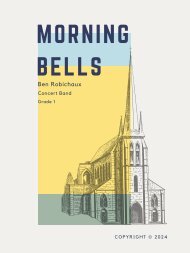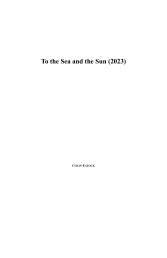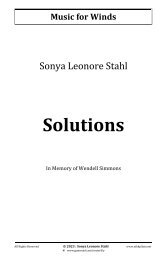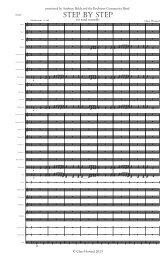ADDITIONAL INFORMATION The original version of <strong>To</strong> <strong>Right</strong> <strong>Our</strong> <strong>Wrongs</strong> for symphonic band + optional choir was commissioned as part of The Kneel Consortium, led by Rachel Maxwell and Josh Johnson. The composer expresses their heartfelt gratitude to the following consortium members for being a part of this project and supporting this work. SCHOOL GROUPS Adlai E. Stevenson High School, Lincolnshire, IL Alabama State University, Montgomery, AL Antioch Upper Grade School, Antioch, IL Batavia High School, Batavia, IL Bednarcik Junior High School, Oswego, IL Bloomington Junior High School, Bloomington, IL Bullard High School, Fresno, CA Cardinal Heights Upper Middle School, Sun Prairie, WI Cienega High School, Vail, AZ Clovis West High School, Fresno, CA Crestdale Middle School, Matthews, NC Crystal Lake South High School, Crystal Lake, IL Dirksen Junior High School, Joliet, IL Downers Grove North High School, Downers Grove, IL Downers Grove South High School, Downers Grove, IL Dripping Springs High School, Dripping Springs, TX Dripping Springs Middle School, Dripping Springs, TX Elmhurst University, Elmhurst, IL Elmwood Park High School, Elmwood Park, IL Evanston <strong>To</strong>wnship High School, Evanston, IL Freeburg Community High School, Freeburg, IL Genoa-Kingston High School, Genoa, IL Glenbard East High School, Lombard, IL Glenbrook North High School, Northbrook, IL Gompers Junior High, Joliet, IL Herget Middle School, Aurora, IL Heritage Grove Middle School, Plainfield, IL Hinsdale Middle School, Hinsdale, IL Hoffman Estates High School, Hoffman Estates, IL Hufford Junior High School, Joliet, IL Huntley High School, Huntley, IL Illinois State University Symphonic Band, Normal, IL Indiana Bandmasters Association, IN James Campbell High School, Ewa Beach, HI John F. Kennedy Middle School, Plainfield, IL Joliet Central High School, Joliet, IL Joliet West High School, Joliet, IL Kirkwood High School, Kirkwood, MO Lakes Community High School, Lake Villa, IL Lakeside Pride Symphonic Band, Chicago, IL Libertyville HS, Libertyville, IL MacArthur Middle School, Prospect Heights, IL McHenry High School, McHenry, IL Metea Valley High School, Aurora, IL Kromrey Middle School, Middleton, WI Mound Westonka High School, Minnetrista, MN Murphy Jr. High School, Plainfield, IL Naperville North High School, Naperville, IL Nazareth Academy, La Grange Park, IL Neuqua Valley High School, Naperville, IL New Trier High School, Winnetka, IL Nichols Middle School, Evanston, IL Niles West High School, Skokie, IL North Crawford High School, Soldiers Grove, WI Northbrook Jr High, Northbrook, IL O'Fallon <strong>To</strong>wnship High School, O'Fallon, IL Oswego East High School, Oswego, IL Oswego High School, Oswego, IL Parkway West High School, Chesterfield, MO Plainfield Central High School, Plainfield, IL Plainfield East High School, Plainfield, IL Plainfield North High School, Plainfield, IL Plank Jr. High School, Oswego, IL Prairie Grove Junior High School, Crystal Lake, IL Prospect High School, Mt. Prospect, IL Rachel Carson Middle School, Herndon, VA Richmond-Burton Community High School, Richmond, IL Rotolo Middle School, Batavia, IL Sheldon High School, Eugene, OR South Dade Senior High School, Homestead, FL Sycamore Springs Middle School, Dripping Springs, TX Temple University, Philadelphia, PA Thompson Junior High, Oswego, IL Traughber Junior High School, Oswego, IL Unit 5 Music Parents, Normal, IL University of Illinois Marching Illini, Urbana-Champaign, IL Vernon Hills High School, Vernon Hills, IL Victor J Andrew High School, Tinley Park, IL Washington Junior High School & Academy, Joliet, IL Washington Middle School, Aurora, IL Waubonsie Valley High School, Aurora, IL West Aurora HS, Aurora, IL Westview Hills Middle School, IL Yorkville High School, Yorkville, IL Zion-Benton <strong>To</strong>wnship High School, Zion, IL INDIVIDUAL MEMBERS Laurie Bonner-Baker Dr. Andrea Brown Jennifer Gavel Dr. Arris Golden, in honor of my parents, Bobby and Araminia Golden Dr. Anthony Messina, dedicated to all my past, present, and future students of color Margene Pappas Lori Penzien Angela Rennick Angela Roeser Will Satterwhite Erick Von Sas
PERFORMANCE NOTES -Some of the transposed copies split into octaves in consideration of a particular instrument's idiomatic capabilities. If a particular staff where this occurs can be doubled (ex: if you have a flute and oboe player available to play on Part I), have each of the players divide into the indicated octaves wherever possible. -Cue-sized notes are optional passages the players may choose to perform. -At measures 40 and 143, Part II performs excerpts of The Star-Spangled Banner as part of the composer's conceptual ideas for the original version of this work (these passages were originally written for solo muted trumpet). These two solos were intended to be played off-stage if possible. For this arrangement, and if Part II can be doubled, the composer recommends that the solos still be played off-stage if possible, regardless of the instrument these solos are assigned to for performance. -CHOIR (if used): There is a single baritone part with a higher tessitura written for younger singers, and tenor and bass parts with appropriate tessituras for older singers. The composer recommends that one or the other be used depending on the age of the performers. In either case, the same soprano and alto parts can be used. -Sus. Cym., China Cym. (if either or both are used): Mallets and sticks are required. When using sticks, the parts specify to either strike the cymbals with the bead (the head) or the shaft (the middle) of the sticks. For the Sus. Cym. part, this instruction applies to both the edge and the bell/dome of the cymbal. And the rocket's red glare the bombs bursting in air gave proof through the night that our flag--- Stony the road we trod, bitter the chast'ning rod felt in the days when hope unborn had died; yet with a steady beat, have not our weary feet come to the place for which our fathers sighed? We have come over a way that with tears have been watered we have come treading our path through the blood of the slaughtered gloomy past, 'til now we stand at last where the white gleam of our bright star is cast Lift ev'ry voice and sing 'till earth and heaven ring ring with the harmonies of liberty let our rejoicing rise high as the list'ning skies let it resound round as the rolling sea. TEXT --Text by Francis Scott Key and James Weldon Johnson

















